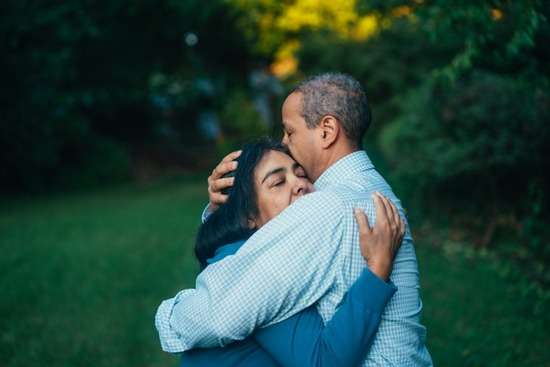Around the world, many cultures and religions have various marriage traditions, expectations, or even rules when it comes to choosing a partner, planning the wedding, extended family logistics, or a number of other things.
So it’s possible that some might wonder if Seventh-day Adventists have any specific rules about marriage.
In general, however, the answer is no. Especially in North America, Adventists approach marriage in the same ways many other mainstream Protestant Christian denominations do.
And while we don’t have any distinct Adventist “rules,” we think marriage is one of the most sacred relationships we can have on this earth.
Why?
Because it’s the example God gives us in His Word about the beautiful, self-sacrificing love that exists between Jesus Christ and His people.
That means that Adventists do uphold Bible-based principles and guidelines to help build a healthy marriage.
And that’s what we’ll talk about here. So whether you have a friend marrying an Adventist, are dating an Adventist and are interested in marriage, or you’re just plain curious, this information should help.
We’ll cover questions like:
- What does the Adventist Church believe about marriage, and what does the Bible say?
- How do Adventists approach different aspects of marriage, including:
As you can see, there is a lot to cover, so let’s jump right into the first question.
What do Adventists believe about marriage?

Photo by Luis Tosta on Unsplash
Adventists believe that marriage is a sacred, God-given covenant between one man and one woman. It is something to be enjoyed and celebrated by the couple and those around them. And it should be based on self-sacrificing love and mutual respect.
And when we turn to the Scriptures, where we get all our beliefs and principles, we find that marriage comes down to two things: covenantal love and selfless love.
Specifically, if we look at God’s love for the children of Israel, and, later on, Jesus’ love for His people, we find the perfect example of marriage that Adventists strive to live out in their own relationships.
So let’s quickly explore these two principles and see what the Bible says about them and how it applies to marriage.
Covenantal Love
Throughout the Bible, God shows His desire to enter into a covenantal relationship with His people.
That’s a phrase we don’t hear too often. What does it mean?
In the context of the Bible, a covenantal relationship represents the deepest level of commitment and partnership.
A covenantal relationship demonstrates a promise. This kind of devotion says, “I’m going to be by your side,” “We are going to work together towards a common goal,” and “Even when you mess up, I will be there for you.”
But it’s more than that too. The covenantal relationship takes commitment and devotion one step further. It’s not just “I’m going to be by your side forever,” it’s, “I’m going to enter into an official, public agreement with you that is sacred and binding.”
In other words, people who enter into a covenantal relationship take love seriously enough to make a legal and official commitment. Not because they need that to prove their love but because they eagerly want to declare their promise and commitment to the world.
That’s exactly how God’s relationship with His people works in the Bible. He doesn’t need to prove His love. He is love, after all (1 John 4:16). But, He wanted to publicly demonstrate His love to the children of Israel (along with others they encountered). If anything, this kind of relationship shows how seriously God takes commitment and love in general.
God’s covenantal love can be found all over the Bible in both the Old Testament and New Testament, but here are a couple of our favorite examples:
- Deuteronomy 7:9: “Therefore know that the Lord your God, He is God, the faithful God who keeps covenant and mercy for a thousand generations with those who love Him and keep His commandments” (NKJV).
- Psalm 103:17-18: “But the mercy of the Lord is from everlasting to everlasting, on those who fear Him, and His righteousness to children’s children, to such as keep His covenant, and to those who remember His commandments to do them” (NKJV).
- Jeremiah 31:31-33: “Behold, the days are coming, says the Lord, when I will make a new covenant with the house of Israel and with the house of Judah— not according to the covenant that I made with their fathers in the day that I took them by the hand to lead them out of the land of Egypt, My covenant which they broke, though I was a husband to them, says the Lord. But this is the covenant that I will make with the house of Israel after those days, says the Lord: I will put My law in their minds, and write it on their hearts; and I will be their God, and they shall be My people” (NKJV).
While covenantal love should be two-sided, many of the examples in the Bible are of God expressing sorrow for His children after they have broken their covenant with Him.
In fact, the application to marriage becomes even clearer if we consider the example in the book of Hosea.
God illustrates His broken heartedness over Israel’s ruptured covenant with Him and uses the unfaithful marriage between the prophet Hosea and his wife Gomer as an example. God says that Israel has been “adulterous,” choosing idols and false ideologies over Him.
But covenantal love is steadfast. Even after repeated betrayal, God says to Israel, “How can I give you up? … My heart churns within me, my sympathy is stirred” (Hosea 11:8, NKJV).
It’s truly a beautiful example, not only of how committed God is to us—He will not give us up—but also of how God desires for us to commit to each other.
Of course, we are not God. We are imperfect. Sometimes, even within the context of marriage, people can betray their spouse and wound them so deeply, whether through adultery, abuse, or otherwise, that the covenantal relationship cannot be repaired.
While covenantal love is the ideal, that does not mean a person should stay in a dangerous or abusive situation. More on that later.
For now, let’s talk about the other biblical principles that guide Adventist marriages.
Selfless love

Photo by Gus Moretta on Unsplash
Selfless love is the core principle that Adventists apply to their marriage relationships. It’s the purest form of love, as it is completely unconditional. It should be the cornerstone of any relationship, and the Bible supports this.
When you consider the teachings of Jesus and what the Bible says about His love for us, it becomes clear that selfless love is at the heart of the Bible and the plan of salvation. Likewise, it should be the foundation of every marriage!
Selfless Love is pretty self-explanatory—it’s love that’s unselfish. It’s always oriented toward serving someone else and putting them above yourself.
And while it’s kind of easy to define, it’s especially hard to live out. Selfless love sometimes feels counterintuitive to how we think about love in the modern day. Love is often portrayed as a feeling that makes me happy and gives me fulfillment.
Selfless love says the opposite: love and marriage should be about the other person, not about you. It’s about service to a person you love more than your own life. That, like Jesus says, exhibits the greatest love: “to lay down one’s life…” (John 15:13, NKJV).
This principle is exemplified through Jesus’ selfless sacrifice for us on the Cross. And this same image is used when Paul talks about marriage in Ephesians 5. He calls husbands and wives to submit to each other.
And the marriage relationship is compared to Jesus’ relationship with His people, who He sacrificed Himself for. So, Adventists believe that marriage is about loving your spouse selflessly so that your relationship is in a state of mutual submission.
There are many more lessons we can learn from the Bible about marriage, but these two principles—covenantal and selfless love—are the foundation of how Adventists think about marriage. Every other guideline and principle we have draws precisely from these two foundational principles.
Is love all you need?
While love should be the foundation of all marriage relationships, there is more to marriage than love.
Selfless love can exist in many types of relationships. But love doesn’t automatically equal compatibility.
Two people may have great mutual respect and love for one another. But if they’re not compatible, building a life together will be difficult. Or it may not work out at all.
For a marriage to work, it needs both. And compatibility builds on a strong foundation of selfless love. This means that, when it comes to core values, beliefs, and priorities, the couple is united and understanding of each other. They are a team.
And it’s because compatibility is so crucial that the Adventist Church has particular guidelines and specifications on many of these topics. After all, the Bible does ask, “Can two walk together, unless they are agreed?” (Amos 3:3, NKJV).
While these might sound like “rules,” they aren’t. Instead, they are principles that Adventists believe will help a marriage flourish when both parties keep them in mind and proceed accordingly.
Adventist thoughts about marriage

Photo by Andy Holmes on Unsplash
Now let’s go over a few quick answers to your questions about Adventists and marriage. We’ll cover many different topics, so you can jump to the ones you’re most interested in.
- Choosing a marriage partner
- Living together before marriage
- The marriage process
- Adventist weddings
- Intimacy
- The role of faith in the relationship
- Marriage roles
- Conflict resolution
- Church support for marriage
- Divorce
- Remarriage
Note that though we speak generally about Adventists, Adventism is made up of individuals! This means that these topics might be regarded differently by different people, depending on how that person was raised, what their cultural customs and practices are, and their own personal preferences.
Choosing a marriage partner
The underlying principle of this point is that Adventist individuals have complete personal freedom to choose who they want to date and marry.
Adventists do often date and become engaged to other Adventists. This is largely because they tend to find themselves in similar spaces, like at church, activities/functions, school, college, etc.
And it’s also likely that two Adventists may find more in common than an Adventist paired with someone who isn’t, or especially someone who isn’t a Christian.
The Bible does mention some guidelines for marrying people who believe differently than you, such as instructions to the children of Israel in Deuteronomy (Deuteronomy 7:3-4) or to the early church in 2 Corinthians 6:14-15.
While these verses can offer general guidance and caution, we have to remember that they were written in a specific context for a specific people. In both situations, God was trying to preserve and nurture a fragile, new group of people, specifically selected to further His message.
And we can see from the example of the children of Israel that whenever they did intermarry with other people groups—like those who promoted idol worship—it often resulted in pain on both sides.
But there is no explicit rule that prohibits or discourages Adventists from dating and marrying individuals with differing beliefs. The church manual does acknowledge that marriages between people who uphold similar beliefs and values are more likely to thrive, but its final message is this: If couples of differing beliefs choose to be married, the church would treat them with “love and concern with the purpose of encouraging the couple toward complete unity in Christ.”1
Living together before marriage

Photo by No Revisions on Unsplash
Cohabitation, or living together before marriage, is common nowadays. And while the Adventist Church doesn’t specifically mention it in an official capacity, Adventists generally would advise against it.
It comes back to the principle of a covenantal relationship. If covenantal love is one of the biblical models for marriage, then two individuals should be prepared to enter into a public promise of their love for each other, such as in a wedding ceremony.
Another thing to consider is that more often than not, couples who live together before marriage are sexually active. This kind of intimacy, practiced before the covenantal promise of marriage, can lead to a lot of hurt and complications if the couple decides to separate.
While the Bible doesn’t explicitly mention cohabitation (which rarely would’ve occurred in the ancient world), we can always remember that God’s desire for us in marriage is to enter into a covenant together. Living together before marriage may undermine the covenantal promise that couples should enter into.
The marriage process
What does the marriage process look like for Adventists? It’s probably not much different than you might expect. Adventist individuals usually date for however long they need/like.
Once engaged, Adventists usually try to do a few sessions of premarital counseling with an Adventist counselor or pastor. The Seventh-day Adventist Church Manual states that “the main purpose of premarital education/counseling is to prepare couples for the challenges they will encounter in married life” (p. 160). But this isn’t required. However, in the United States, you can actually get a discount on your marriage license if you have proof of premarital counseling (depending on the state)!2
You can find resources to learn more about premarital counseling at the Adventist Family iMnistries website.
Adventist weddings
Adventist weddings are similar to many other Christian weddings. The service is usually spiritually-oriented, as Adventists regard marriage as a both a personal and spiritual commitment.
The reception is a fun and celebratory time! It’s often filled with good food, laughter, music, games, and endearing speeches.
One difference some may notice, however, is that Adventists tend to forgo alcoholic drinks, but will sometimes have sparkling cider for toasts.
Just like any other celebration, Adventist weddings will vary based on the culture and customs of the couple getting married.
Intimacy in Adventist marriages
Adventist marriages should be intimate: physically, emotionally, and spiritually. When we think about physical intimacy, specifically in a marriage, we can remember the biblical principles we talked about earlier. Sexual intimacy should exhibit devotion and selfless love to your spouse.
For Adventists, like many other Christians, sexual intimacy is something that ideally happens within the context of marriage. It is something that is regarded as beautiful, special, enjoyable, and deeply bonding. Considered a gift from God, intimacy should be regularly enjoyed within a marriage, with mutual love and respect at its core.
The role of faith in Adventist marriages

Photo by Cassidy Rowell on Unsplash
Faith plays an important role in an Adventist marriage. Adventist pastors, when officiating wedding ceremonies, often say that a marriage commitment is both horizontal and vertical. That refers to commitment between spouses, and between the couple and God. It is only through an intentional relationship with God that we can grow in the selfless love that will make a marriage relationship thrive.
Faith in an Adventist marriage means both nurturing your faith individually and together. Each individual in a marriage should do what they can to maintain their own faith. Then, together, they can help each other continue to grow their faith in new ways. Many Adventist couples pray, read the Bible, and do daily devotions together to nurture their faith as a couple.
Marriage roles
The Adventist Church has no official guidelines or expectations regarding marriage roles. And Adventists can figure out roles within a marriage themselves. Again, these roles should be based on the principles of covenantal and selfless love. Each partner should consistently seek to serve the other.
We can turn to Adam and Eve—the first couple to ever be married—as our example. In the Garden of Eden, God made Adam and Eve partners. And together, He entrusted them to rule over their domain and care for it (Genesis 1:28). He did not intend for one spouse to rule over the other.
So when it comes to roles and responsibilities, every couple will vary. There is no reason why an Adventist couple shouldn’t be able to choose what they want their marriage to look like as long as it comes back to self-sacrificing, covenantal love and mutual respect.
Conflict Resolution
There isn’t any specific “Adventist way” to resolve conflict. Adventist couples strive to resolve conflict in their marriage the same way that any other healthy, Christian marriage would.
Matthew 18 gives us a good example of conflict resolution:
If your brother or sister sins, go and point out their fault, just between the two of you. If they listen to you, you have won them over. But if they will not listen, take one or two others along, so that ‘every matter may be established by the testimony of two or three witnesses. If they still refuse to listen, tell it to the church” (Matthew 18:15-17, NIV).
Ideally, conflict should be resolved through respectful discussion, where the couple would humbly listen to the other to learn their perspective. But as the example from the Word of God shows, conflicts are not always resolved simply between two people. Sometimes, when conflicts are deeper than routine disagreements, Adventists might seek outside help, which leads us to our next point.
Church support for marriage
The Adventist Church offers a lot of support for married couples, whether that’s through premarital counseling, marriage counseling, or through holding events and seminars to help people nurture their marriages.
Marriage counseling is usually conducted by an in-house counselor or pastor at a host church. In fact, many Adventist pastors also have degrees in marriage and family counseling, though that isn’t a requirement to become a pastor. Couples struggling in their marriages, whether with infidelity, addiction, or seemingly irreconcilable differences, can seek counsel in the church.
However, there are instances where Adventist marriages do fall apart, and in that case, divorce is something that an Adventist couple might go through, which brings us to our last point.
Divorce in Adventist marriages

Photo by Sander Sammy on Unsplash
Adventist marriages, like every other marriage, are made up of two imperfect human beings, and as such, are susceptible to all manners of issues. While the ideal is for an Adventist marriage to be a lifelong commitment centered on self-sacrificial love, this doesn’t always happen. So, the Adventist Church does allow divorce.
This means that when a member of an Adventist marriage finds themselves the victim of adultery, other kinds of infidelity, abuse, and other unforeseen circumstances, that person can pursue divorce without fear of disfellowship or judgment from the church or other church members.
The church holds that the unfaithfulness that the Bible talks about as grounds for divorce (like in Matthew 19:9) not only includes adultery but other kinds of unfaithfulness as well. This includes incest, rape, sexual abuse, or other things “recognized as a misuse of sexual powers” and “violations of the divine intention in marriage” (Seventh-day Adventist Church Manual, p. 165).
Remarriage in the Adventist church
Remarriage is a deeply personal decision, and the Adventist Church recognizes that. In cases where an individual’s partner has died, or has divorced them because of abandonment due to differing spiritual beliefs or unfaithfulness, then the Adventist Church supports remarriage, which it believes to be in line with Jesus’s words in Matthew 19:9 and 1 Corinthians 7:10-15.
While death and unfaithfulness have no place in God’s original plan for marriage, we live in a broken and sinful world where these things happen. Someone who has been the victim of this should not be kept from marrying again.
As with all things, God is merciful, and the Seventh-day Adventist Church Manual makes it clear that God’s mercy and grace prevail over the complications that divorce and remarriage may bring.
To be more like Christ
In the end, an Adventist marriage is meant to draw both members closer to each other and closer to Christ. We would hope that Adventists who choose to get married would learn even more about the selflessness of Christ and strive to be a shining example of His love to each other and to those around them.
Looking for more information about healthy, principled relationships?
Related Articles
- Seventh-day Adventist Church Manual, p. 160 [↵]
- https://www.findlaw.com/family/marriage/marriage-license-requirements.html [↵]
More Answers
What’s Vacation Bible School? (And Should I Enroll My Kids?)
Vacation Bible School (VBS) is a weekday summer program organized by churches to help kids make friends in a positive environment, participate in constructive activities, and learn more about Jesus and the Bible.
What is the Role of Laypeople vs. the Role of Clergy?
The word “laity” comes from the Greek word laikos, which means “of the people.”
Do Seventh-Day Adventists Have “Rules” For Clothing?
Many religions have guidelines on dress, but what about the Adventist Church? Discover how Adventists choose to dress based on biblical principles.
11 Reasons People Become Seventh-day Adventists
Curious why many people become Adventists? Here are elements of Adventist beliefs, values, and mission often reflected in people’s decisions to join.
What’s the Seventh-day Adventist General Conference Session?
At the General Conference Session, Adventist delegates from around the world gather to assess the state of the organization, pray, and discuss current issues. Here’s how it works.
How Adventists View the End of the World
The end of the world is no fun to think about. But here’s how we can actually find hope and comfort in what’s to come.
What Is an Adventist Medical Missionary?
A medical missionary in the Adventist Church is someone who cares for the medical needs of people as a way of showing the love of Jesus. They may travel to another country, or even just serve in their hometown.
Is the Seventh-day Adventist Church Protestant?
Learn how the beliefs of the Seventh-day Adventist Church align with the “5 solas” of Protestantism.
Are Seventh-day Adventists Evangelicals?
According to its origins and definition, evangelicalism is about following Jesus and the Bible and sharing the Gospel through the way we live our lives. Adventists wholeheartedly harmonize with these principles.
Could Anything Keep Me from Becoming an Adventist?
We are each saved through Christ. But when it comes to church membership, are there certain beliefs or expectations to become an Adventist?
Do Seventh-day Adventists Have “Rules”?
We uphold principles we believe will help us maintain a closer relationship with Jesus and His Word. Learn how these principles guide Adventist lifestyles.
Can a Seventh-day Adventist Marry a Non-Adventist?
Yes. Seventh-day Adventists are not under any official rules that dictate who they can or cannot marry. This is a personal, life-altering decision between the couple and God.
What Adventists Believe About Alcohol and Tobacco Use
The Seventh-day Adventist Church has historically discouraged the use of alcohol and tobacco. Even before the church started in 1863, its leaders were realizing the negative effects of these substances.
Jewelry—Why Do Many Seventh-day Adventists Choose Not to Wear It?
If you walk into a Seventh-day Adventist church service, you might notice that many people aren’t wearing earrings, bracelets, necklaces, or sometimes even wedding rings.
International Pathfinder Camporee
Youth aged 10-15 in the Adventist Church’s global Pathfinder program look forward to the International Camporee every 5 years. This event brings together Pathfinders from around the world for exciting activities.
How Adventists interpret Bible prophecy
Bible prophecy conjures up a variety of emotions in people. For some, it feels exciting or mysterious.
Moviegoers’ Guide to The Hopeful: The Facts Behind the Film
Learn where and when you can watch The Hopeful and how to get tickets. Already seen it? We’ll uncover the real story that inspired this film.
How Are Seventh-day Adventists Different from Other Protestants?
As a Protestant Christian denomination, the Seventh-day Adventist Church regards the Bible as the ultimate guide and looks to Jesus Christ as the only way to salvation. We do have some differences of belief or interpretation when it comes to topics like Bible prophecy, end-time events, the Sabbath, and a person’s state after death.
How Adventists Handle Death and Funerals
Most Seventh-day Adventist funeral services are similar to those of other Protestant denominations, such as Methodists, Baptists, or Presbyterians, but you might find a few differences or unique nuances.
Adventist Culture
Many Seventh-day Adventists adhere to specific lifestyle principles that can make them stand out from those in other Christian denominations. Whether it’s going to church services on Saturday or eating the popular Adventist entrée of “haystacks.”
Do Adventists Observe Easter-Related Holidays?
Jesus Christ’s resurrection, celebrated on many Easter-related holidays, is central to the beliefs of the Seventh-day Adventist Church. And that means we seek every opportunity to remember it.
An Overview of Seventh-day Adventist Higher Education
The Seventh-day Adventist Church has about 118 tertiary schools around the world. Though many of them are within North America, you’ll also find Adventist universities in countries across the world—places like Croatia, Austria, Brazil, Madagascar, and the Philippines.
The Ten Commandments from a Seventh-day Adventist Perspective
Ever eaten a salad and gotten a big piece of green stuck in your teeth? And you didn’t realize it was there until you looked in the mirror? (Because no one ever told you!)
The Benefits of A Seventh-day Adventist Academy
Adventist academies are high schools (grades 9-12) that are owned and operated by the Seventh-day Adventist Church.
Are Seventh-day Adventists Christians?
Yes, the Seventh-day Adventist Church is a Protestant Christian denomination formed in 1863. Just like other Christians, we believe that Jesus Christ is our Savior and seek to follow the principles of the Word of God.
Adventist Movies: Where Faith and Film Meet
The Adventist Church uses film to share our faith and uplift positive values. Learn more about specific Adventist-produced films and where to find them.
Do Adventists Celebrate Christmas?
In general, most Seventh-day Adventists do celebrate Christmas.
Since our denomination doesn’t have specific guidelines about holidays, it’s up to each member to decide whether to celebrate it based on their personal convictions and study of the Bible.
What Does the Bible Say About Modesty
Seventh-day Adventists and Christians in general try to ensure their outward presentation and lifestyle glorify God. This often involves daily habits like the ways we hold conversations, the ways we dress and accessorize, and the ways we regard other people when we’re out and about.
How Do Adventists Make Movie and Music Choices?
How do Adventists decide what music to listen to and which movies to watch? Learn how Bible principles can help us make better entertainment choices.































